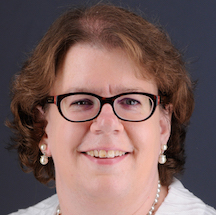The First Woman to Win Sandia National Laboratories’ International Meshing Roundtable Fellow Award
Posted on Nov 26, 2021 | Comments 0
 Suzanne Shontz, a professor of electrical engineering and computer science at the University of Kansas, is the first woman to receive the International Meshing Roundtable Fellow Award. “It makes it more special knowing that I’m the first woman,” said Professor Shontz. “I’m hoping it’s a sign that more women will get more involved in the field over time.”
Suzanne Shontz, a professor of electrical engineering and computer science at the University of Kansas, is the first woman to receive the International Meshing Roundtable Fellow Award. “It makes it more special knowing that I’m the first woman,” said Professor Shontz. “I’m hoping it’s a sign that more women will get more involved in the field over time.”
The International Meshing Roundtable Fellow Award is given out by Sandia National Laboratories. The award recognizes an individual with a distinguished record of research accomplishments in mesh generation and exceptional service in the meshing community. Sandia National Laboratories is operated as a wholly-owned subsidiary of Honeywell International, Inc., for the U.S. Department of Energy’s National Nuclear Security Administration.
Mesh generation — or meshing — is the mathematical and computational process of building items out of many shapes. Meshing is used for simulation analysis and rendering models in the fields of engineering, medicine, and even fashion — leading to a better understanding of structures and processes. Research in Dr. Shontz’s lab has created a mesh of the human heart that simulates the motion of a beating heart and has designed algorithms for high-order mesh generation, parallel meshing, mesh optimization, and mesh untangling.
Profesor Shontz hopes to encourage young undergraduate engineering students, especially women, to pursue graduate school and additional education in the field of meshing. She does this by involving undergraduate researchers in her lab. “I hope more women over time will get to know about these opportunities and see if it’s something that they might like to do,” Dr. Shontz said, “and hopefully grow the field that way.”
Prior to joining the faculty at the University of Kansas in 2014, Dr. Shontz was on the faculty in the department of mathematics and statistics at Mississippi State University and the department of computer science and engineering at Pennsylvania State University. She is a summa cum laude graduate of the Univerity of Northern Iowa, where she double majored in chemistry and mathematics. Professor Shontz holds master’s degrees in computer science and applied mathematics and a Ph.D. in applied mathematics from Cornell Univerity in Ithaca, New York.
Filed Under: Awards








